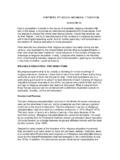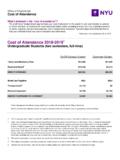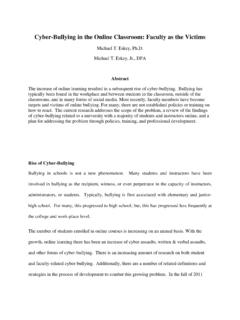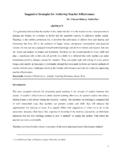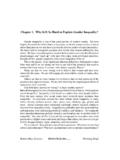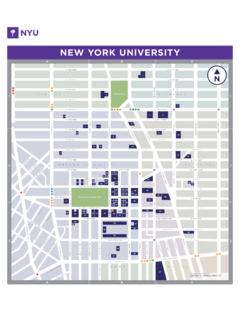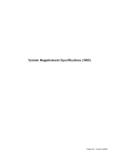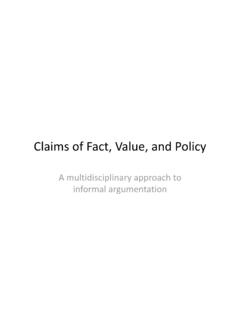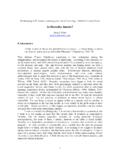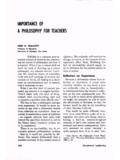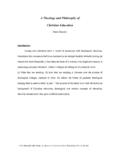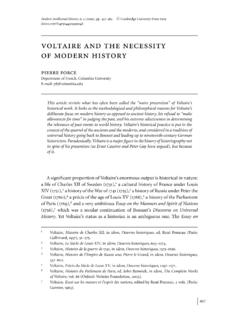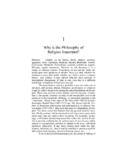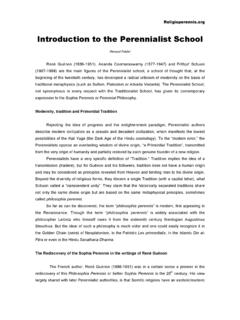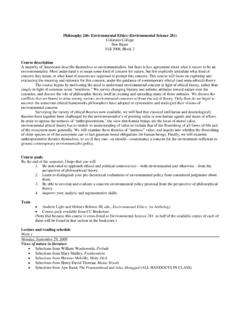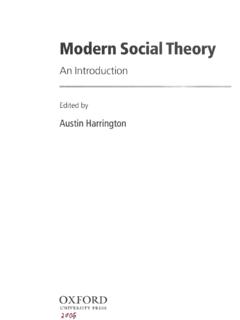Transcription of Ethics or Morality
1 1 Ethics or Morality ? Many authors use the terms ethical and moral interchangeably, either unaware or dismissive of different connotations carried by the The Latin moral was coined by Cicero to translate ethical from Greek philosophy so that at the start the two words were equivalent. But after two thousand years of history in classical and modern languages there is likely to be divergence in their connotations. What follows is based on historical facts and some speculation on the connotations carried by the words today.
2 The first thing to note is that the two words share a mix-up in their origins. Hannah Arendt says that the fact we use ethical and moral to address questions of right/wrong, good/bad is indicative of our confusion in this What she is referring to is that etymologically ethical and moral simply refer to customs or habits. Ethical was used in a phrase referring to excellence in habits or customs. Similarly, the Latin derived moral was the modifier of a word meaning virtue or strength. Ironically, the subordinate words, ethical and moral , were retained for articulating a code of right and wrong while the important ideas of excellence and strength were eclipsed.
3 A further problem is then reflected in the fact that we have lost the difference between two kinds of excellence/virtue: intellectual and moral . Aristotle notes that intellectual virtue owes both its inception and its growth chiefly to instruction, and for this reason needs time and experience. moral goodness, on the other hand, is the result of habit, from which it actually got its name, being a slight modification of the word ethos. 3 Intellectual virtue should give direction to moral virtue. Naming issues of good/bad, right/wrong as ethical or moral had the effect of practically eliminating intellectual excellence/virtue, a problem that still haunts us.
4 The most important influence on our contemporary meaning of moral was a long incubation in the Christian religion. moral still touches a religious nerve for many people and carries some of the meaning that Christian theology gave to moral virtue. In contrast, the most important influence on ethical was modern enlightenment s attempt to find a foundation for judgments of right or wrong outside Christianity. Although the term ethical is closely associated with the work of Aristotle, modern Ethics was more profoundly connected to Socrates. Ethics was an attempt to recover the intellectual or rational basis of action that was obscured by a Christian Morality .
5 The word ethical had disappeared in Latin and western languages until the late middle ages. There were no treatises on Ethics in the Christian medieval period. There is some logic, therefore, in the fact that histories of Ethics often jump from ancient Greece to the seventeenth century with little discussion of the centuries in between. Henry Sidgwick s 1892 Outlines of the History of Ethics has one chapter on Christianity and Medieval Ethics in which the term Ethics hardly appears. John Dewey s history of Ethics has three pages to cover the period from the Romans to the Renaissance.
6 Alasdair McIntyre s 1966 book, A Short History of Ethics , has one ten-page chapter entitled Christianity. 4 Historians looking in the Middle Ages for Ethics do not find it and they may dismiss medieval Morality as part of theology. The problem is that secular Ethics in modern times cannot be well understood without grasping the influence of Christian moral teaching. 2 In English, moral remained the more prominent term up to the nineteenth century. In David Hume s 1751 book, Enquiry Concerning the Principles of Morals, reason is described as the slave of Much of modern Ethics is an attempt to escape from that bind.
7 Can ethical reasoning be so developed as to keep passion in a subordinate role? Ethics became the ascendant term in the latter half of the nineteenth century and throughout the twentieth century. In today s language, differences by class, religion, and age are a residue of this ethical/ moral history. In regard to class, every modern profession has a code of Ethics , a body of ideals and general principles that are supposed to guide the professional. In contrast, the laboring class have codes of moral conduct that are much more specific about laborers showing up for work, following the rules on the job, and being paid for what they actually do.
8 Concerning religious differences, Jews became comfortable with Ethics as an alternative to Christian moral theology. In the twentieth century, Protestant Christianity constructed an academic field called Christian Ethics . Roman Catholics, at least until the Second Vatican Council, continued to have a moral code based on moral theology. Thus, Christian Ethics did not include Catholics; moral theology did not include Protestants. That sharp division has been blurred in the last few decades but differences remain in the way Protestants and Catholics use ethical and moral .
9 As for differences by age, ethical and moral differ in application to children and adults. Children are thought to be in need of moral rules and moral training. Explanation of the rules may or may not be available but the rules must be followed. The gradual understanding of these moral rules was named moral development. The psychologist Lawrence Kohlberg practically owned the term moral development for several decades. Kohlberg hardly ever used the term He was following a path laid out by Emil Durkheim s 1900 book, moral Education and Jean Piaget s 1932 book, The moral Judgment of the Child.
10 A child develops morally; if successful in that development, he or she becomes an ethical adult. Ethics today is the name of an academic subject taught in philosophy departments and professional schools of the university. Until the nineteenth century, colleges offered a course on moral philosophy; it was often the capstone of the curriculum and taught by the college s president. Today the term moral is likely to appear in the university only in the psychology department or in the school of education. The adjectives moral and ethical seem close in meaning.
